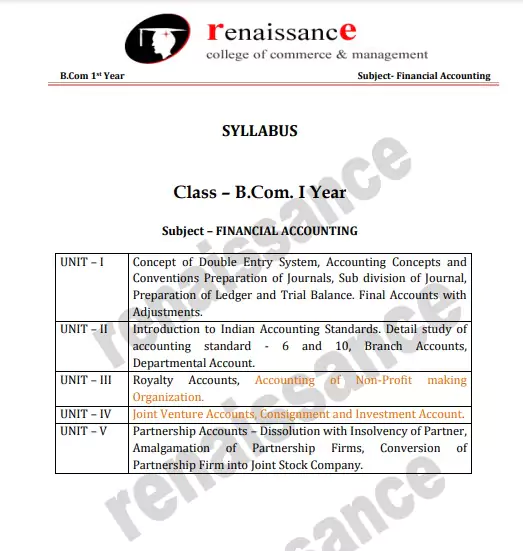‘Bachelor Of Commerce Financial Accounting’ PDF Quick download link is given at the bottom of this article. You can see the PDF demo, size of the PDF, page numbers, and direct download Free PDF of ‘B.Com. 1st Year Financial Accounting’ using the download button.
B.Com 1st Year Financial Accounting Book PDF Free Download

Financial Accounting Syllabus
UNIT-I
FUNDAMENTAL PRINCIPLES OF FINANCIAL ACCOUNTING
According to the American Institution of Certified Public Accountant Committee:-
“Accounting is the art of recording, classifying and summarizing in a significant manner and in terms of money transactions and events which are in part at least, of a financial character, and interpreting the results thereof”.
From the above definition, it can be said that “Accounting is the science of recording and classifying trading transactions of financial nature and is an art in which financial results are summarized and interpreted.”
Characteristics of Accounting
1) Accounting is a science as well as an art.
2) The transaction and events relating to the financial nature are recorded in it.
3) All transactions and events are recorded in monetary terms.
4) It maintains complete, accurate, permanent and legible records of all transactions in a systematic manner.
5) It analyses the results of all the transactions in detail.
Objectives of Accounting
To Maintain a Systematic Record
Accounting is done to maintain a systematic record of the monetary transactions of the firm which is the initial step leading to the creation of the financial statements.
Once the recording is complete, the records are classified and summarized to depict the financial performance of the enterprise.
To Ascertain the Performance of the Business
The income statement also known as the profit and loss account is prepared to reflect the profits
earned or losses incurred.
All the expenses incurred in the course of conducting the business are aggregated and deducted from the total revenues to arrive at the profit earned or loss suffered during the relevant period.
To Protect the properties of the Business
The information about the assets and liabilities with the help of accountancy provides control over the resources of the firm because accounting gives information about how much the business has to pay to others.
And how much the business has to recover from others?
To Facilitate Financial Reporting
Accounting is the precursor to finance reporting.
The vital liquidity/solvency position is comprehended through the Cash and Funds Flow Statement elucidating the capital transactions.
To Facilitate Decision making
Accounting facilitates decision-making.
The American Accounting Association has explained this while defining the term accounting, it says accounting is, the process of identifying measuring and communicating economic information to permit informed judgments and decisions by users of the information.
Accounting As Science and Art
Accounting is both a science and an art.
Science as well as we know is the systematical body of knowledge establishing a relationship between causes and their effects.
In other words, science has its own concepts, assumptions and principles which are universal and verifiable.
Accounting as a discipline has also its own assumptions, concepts and principles, which have got a universal application.
Accounts have systematically and scientifically developed accounting equations and rules of debit and credit. It makes accounting, Science.
Art is the practical application of knowledge.
Accounting as a discipline is used in the maintenance of books of accounts practically in real-life situations and day-to-day affairs of the business, so it is an art also.
It can now be safely concluded that Accounting is both a science and an art.
BOOK-KEEPING
Book-Keeping is the proper and systematic keeping or maintenance of the books of accounts. BookKeeping starts from the identification of business transactions.
These transactions must be supported by the documents and they must be financial in nature.
For example, selling goods for cash is an accounting transaction, because cash is received and goods are going outside the business.
The transaction will increase cash and reduce goods.
Book-Keeping involves the following process:
- Identifying accounting transactions
- The initial record of accounting transactions
- Preparation of ledger accounts
- Balance Ledger accounts
- Preparation of trial balance
Accounting Concepts
Meaning and Significance: –
Accounting concepts are those basic assumptions or conditions upon which the accounting system is based. Some of the important accounting concepts are as follows :
1) Business Entity Concept :
As per this concept, the business is treated as a separate entity or unit distinct from that of the proprietor.
The significance of this concept is that without such a distinction the affairs of the business will be mixed up with the private affairs of the proprietor and the true picture of the business will not be available.
The transactions between the proprietor and the business will be recorded in the business books separately and shown separately under the heading capital account.
For example, if when the proprietor invests Rs. 50000 in this business, it will be assumed that the owner has given that much money to the business and will be shown as a liability for the business.
When he withdraws, say Rs. 10000 from the business it will be charged to his capital account and the net amount due to him will be only Rs. 40000.
| Author | – |
| Language | English |
| No. of Pages | 63 |
| PDF Size | 4 MB |
| Category | Accountancy |
| Source/Credits | rccmindore.com |
Related PDFs
Fundamental Of Accounting And Tally Prime Notes PDF
B.Com 1st Year Financial Accounting PDF Free Download
